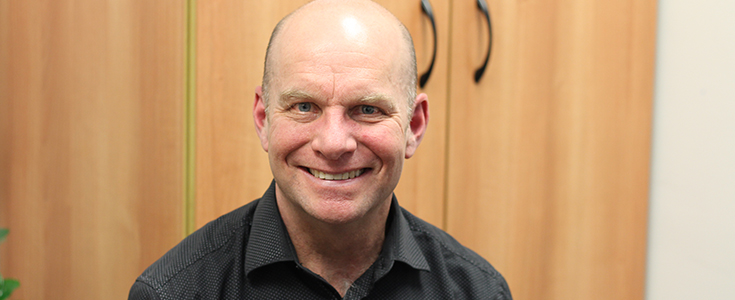Tourette's not always "As Seen on TV," and neither is nursing
When some people think of Tourette's, their minds flash back to stereotypes in movies or television programs featuring adults who involuntarily blurt out obscenities, profanities and derogatory remarks at inopportune moments. In reality, there's a far bigger story to tell.
The same holds true for how people perceive careers in nursing - while our minds often tend to think in terms of emergency rooms, hospital wards and other medicine-related settings, the fact is that there are many nurses who work outside those institutional milieus.
Calvin Barbour is one of them.
As a registered psychiatric nurse (RPN) at the Manitoba Adolescent Treatment Centre (MATC), Barbour works as part of a multidisciplinary team of health care workers providing a range of mental health services to children and adolescents who experience psychiatric and/or emotional disorders. He has worked extensively in Tourette's treatment during most of his 20 years as an RPN.
"I've always felt that psychiatric nursing appealed to me more than the more stereotypical view of nursing as being linked exclusively to the field of medicine," Barbour says, adding that psychiatric nursing can be just as impactful and rewarding.
"I especially enjoy sitting in on assessments, knowing that we can really help families affected by Tourette's," he says. "Over the years, seeing our success stories, seeing individuals who may have been struggling with school and helping out with that, or seeing someone with debilitating anxiety go on to be successful in the workforce, you get to play an important part in really positive change."
Tourette's - also called Tourette's Syndrome or Tourette's Disorder-- is a neurological condition characterized by repetitive, stereotyped and involuntary movements and vocalizations called tics.
According to Tourette Canada, the symptoms usually begin in early childhood around age five, but may occur as early as age one or two, or as late as the age of 17.
"It's more common than most people realize," Barbour says. In fact, Tourette's affects an estimated 6 out of 1000 school-age children, with males being affected more than females at a ratio of roughly four-to-one.
It's often not as debilitating or noticeable as it's portrayed in entertainment circles, Barbour adds.
"For a lot of the kids we see who have Tourette's, the vocal and movement-related tics are not their biggest issue," Barbour says. "They are often more impacted by issues such as anxiety, and related factors such attention deficit hyperactivity disorder (ADHD, which affects 60% of children with Tourette's), obsessive compulsive disorder (OCD, which affects up to 30% of people with a tic disorder) and sleep disorders (as many as 60% of children with Tourette's have problems with sleep)."
And the swearing so commonly linked to Tourette's in movies and TV?
It's a symptom called coprolalia, and only 5-10 per cent of individuals will have that kind of a tic, Barbour says.
"Tics such as sniffing, coughing, throat-clearing, and blinking are far more common, and unless they are really aware of it, people may not recognize these as symptoms of Tourette's. Blinking, nose-scrunching, mouth-widening and facial grimacing are also common. The symptoms can be very subtle."
Many people are also unaware that Tourette's is a condition that can improve over time.
"In the past, we used to think of Tourette's as a chronic condition," Barbour says, "but now we know that up to a third of the individuals diagnosed with Tourette's in childhood might completely outgrow their tics as their brains mature. Another third may experience a significant reduction in their tics, and the other third will find that the tics they experience in adolescence stay roughly the same throughout their adult lives."
As an RPN, Barbour works as a Case Coordinator and part of a multidisciplinary team working in MATC's Tourette Syndrome Service. Services provided may include:
- Assessment (psychiatric, psychological, educational and occupational therapy)
- Individual therapy
- Family therapy
- Group therapy (tic management, positive parenting -Triple P)
- Emotional regulation and organization skills
- Medication management
- School liaison and consultation
- Public education
While there is currently no one treatment that will cure Tourette's, Barbour says there are a number of effective treatment options. These include medications, some of which can decrease the tics by as much as 50 to 70 per cent. A relatively new treatment called CBIT, an acronym for cognitive behavioural intervention for tics, involves learning strategies on how those affected by Tourette's can work to block their tics. It's not offered unless clients are over the age of 12.
Barbour says that working with children and adolescents affected by Tourette's has been a satisfying career choice.
"It's gratifying to see how well they do in our program," he says. "We work with some students for five to eight years, so we get to see how they've progressed over that time. We can help them achieve greater success in school, and can often significantly decrease their symptoms.. I've had other jobs, but nothing has provided the sense of fulfillment I've had in this one."

